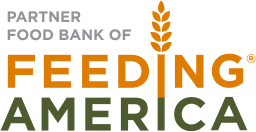By Mary Evans, EDI & Re Entry Manager
Over the past few years, the nation has faced a perfect storm of conditions that have made it harder to put food on the table, including a once-in-a-generation pandemic and skyrocketing prices for food and other necessities. Due to forces like income inequality, many households with low incomes are already spending 30% of their budget on food. Amid higher-than-usual grocery prices, food banks like us, The Foodbank, Inc., are stepping in to fill in the gaps—but food banks are not immune from the impact of inflated costs.
Everyone should be able to access the food we all need to thrive reliably. However, more expensive food is a catastrophe for our 88,420 neighbors facing hunger in Montgomery, Greene, and Preble Counties. The Foodbank, Inc. is part of Feeding America, a network of more than 200 banks, 21 statewide food bank associations, and over 60,000 faith-based and charitable agency partners, including food pantries and meal programs. We know firsthand how great the need for food assistance is in our serving areas.
Our nation’s long history of systemic racism and discrimination has made it especially hard for people of color in our community to access the food they need.
Our organization works around the clock to support children, seniors, people with disabilities and others by putting food on the table. However, doing that job has become trickier as performing our day-to-day tasks—transporting food, storing food—has become pricier. In addition, food donations to food banks have dwindled, making the situation even more challenging.
We are mission driven and here to serve our Neighbors in the hunger line. We also have three main goals:
- Feed the line
- Shorten the line
- End the line
Though not widely known, TEFAP (The Emergency Food Assistance Program) is a vital federal nutrition program that moves food from farms to food banks to individuals and families facing hunger. Amid waning donations, TEFAP and SNAP (Supplemental Nutrition Assistance Program) are vital to the Feeding America network’s food supply. In fact, the TEFAP program provides over 20% of the food distributed through Feeding America food banks and local hunger-relief programs.
The Farm Bill is critical to The Foodbank, Inc. This bill will affect three major components:
1. Farmers
Rural communities are on the front lines of the need for conservation investment and climate-smart agriculture, and the Farm Bill can protect those investments. Coordinating and aligning programs in rural communities does not cost the government more money, but it does grow the economy in rural communities.
2. Federal food funding received
Commodity, Nutrition, Farm Ownership loans are just a few of the many programs that are federally funded under the Farm Bill.
3. SNAP
SNAP is well-designed to respond quickly and effectively to support individuals with low incomes and communities during times of increased need, expanding when the economy weakens and contracting as the economy recovers.
In the 2023 Farm Bill, The Foodbank, Inc., calls on Congress to do the following:
Increase funding for The Emergency Food Assistance Program (TEFAP) and The Supplemental Nutrition Assistance Program (SNAP) to help people facing hunger access nourishing food and support the U.S. agricultural economy.
- TEFAP is a federal nutrition program that moves food from farms to food banks to individuals and families facing hunger.
- Strengthening SNAP funding in the 2023 Farm Bill is a win for our neighbors experiencing food insecurity and Ohio’s farmers. More TEFAP purchases translate to more purchases from local growers and producers—a boon for Ohio’s agricultural economy.
- Making room for BIPOC Farmers in the Farm Bill—and in agriculture more broadly—also has the potential to create space for environmental provisions.
As individuals and families without enough to eat continue to budget, save, and find other ways to weather the circumstances exacerbating food insecurity.
We are calling on Ohio’s 10th Congressional District and the Representatives for Ohio’s 8th & 10th congressional district, to increase TEFAP funding in the 2023 Farm Bill. Such an investment would mean more healthy foods moving from food bank shelves to kitchen tables that our 88,420 food insecure Neighbors sit at.
In short, a perfect storm of conditions is making it harder for food banks to help our neighbors keep their refrigerators full, worsening hunger nationwide. Increasing investments in The Emergency Food Assistance Program (TEFAP) and supporting and strengthening the Supplemental Nutrition Assistance Program (SNAP) in the 2023 Farm Bill is critical to turning the tide.




No comment yet, add your voice below!